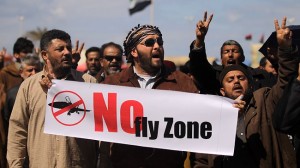
Lebanon said Monday it will take the lead in drafting a U.N. Security Council resolution to impose a no-fly zone over Libya, a measure that still lacks council agreement, following a formal request by the Arab League to enforce vigilance over Libyan skies.
Lebanon’s U.N. ambassador Nawaf Salam said he presented the Arab League decision over the weekend to support a no-fly zone to a private Security Council meeting and that the council “will be meeting soon to make a decision on this matter.”
As forces loyal to Col. Moammar Gadfhafi gain on the rebels, the international community is under increased pressure to act in order to aid the rebels. Officials of the Group of Eight leading industrialized nations are meeting in Paris Monday to discuss possible measures, including the creation of a no-fly zone.
It is politically advantageous for the West if Lebanon takes the lead in drafting the resolution that will incorporate an earlier British-French version of a no-fly zone that was prepared last week, a diplomat said, since it would give the initiative to an Arab country.
Though Lebanon is led by the caretaker prime minister Saad Hariri, talks to form a new government led by Hezbollah are still underway. Hezbollah has supported the rebellion against Col. Gadhafi though has expressed no opinion about a no-fly zone.
“We would like the council to act as quickly as possible and hope there is a consensus,” Mr. Salam said. “It is a necessary measure to put an end to violence, to protect civilians there.”
A diplomat present at the private meeting described a “range of views” being expressed by the 15 member council on a no-fly zone. The Lebanese draft “in the near future” will “enable more concrete discussions soon,” he said.
Diplomats said that with China facing its own civil unrest it was still cool to a non-fly zone that would support anti-government rebels in a region in widespread tumult. China would also not want to jeopardize construction and oil contracts with the Gadhafi regime, they said.
Russia raised operational questions in the meeting about how a no-fly zone would work.
“To say we need to act quickly, as fast as possible, but not to provide answers to those fundamental questions is not really helping, it is just beating the air,” Russian Ambassador Vitaly Churkin told reporters. “You need to be sure any decision the council takes is not going to exacerbate the military-political situation in Libya.”
Mr. Salam said a number of countries have raised legitimate questions along similar lines.
“Some can’t be answered: would it be effective, would it be enough, would it deter Gadhafi, or would it require military action?”
Questions regarding operational details would be answered in the draft Lebanon is preparing, Mr. Salam said.
The U.S. position on a no-fly zone remains unclear, with varying views being expressed by different parts of the Obama administration. Asked in Paris about the no-fly zone, Secretary of State Hillary Clinton said, “I’m looking forward to talking with (United Arab Emirates foreign minister) about events in the region, and that includes everything.”
The Lebanese ambassador said that the “mere imposition of a no-fly zone may stop Gadhafi from flying his planes and attacking his own population. And it may not. These can’t be answered now.”
Mr. Salam said that lessons from the war in Bosnia-Herzegovina showed that even a no-fly zone could not stop massacres on the ground. “It doesn’t mean it was useless, but it was not enough,” he said.
WSJ

Leave a Reply
You must be logged in to post a comment.